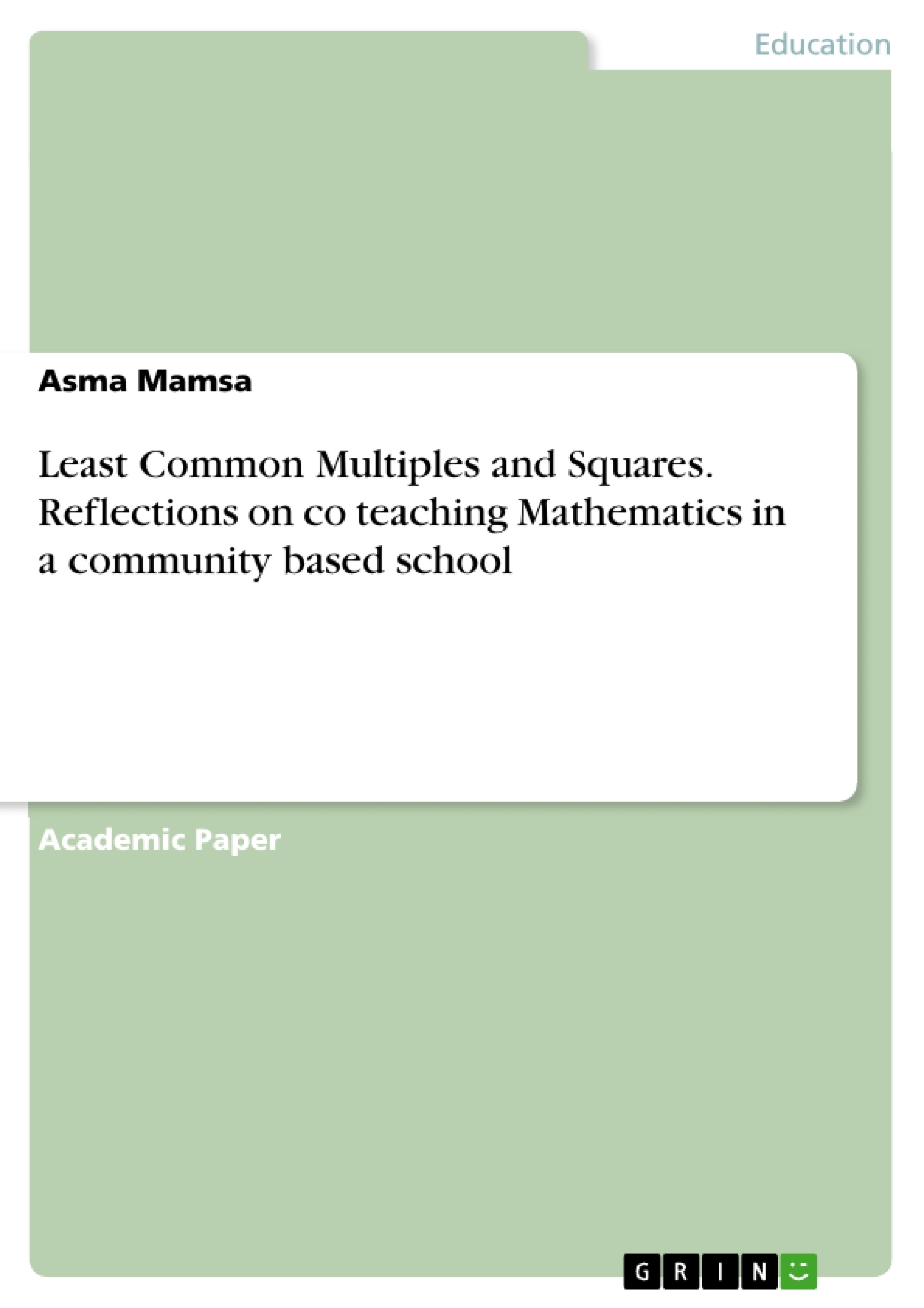This academic paper is based on the reflection of co-teaching experiences in a community based school in Karachi, Pakistan. The author taught in grade V along with the co-teacher Jaweria (pseudonym) who was a veteran Mathematics teacher. A number of situations surprised him and made he reflect deeper into the situation with the help of suitable literature. The importance of Mathematical vocabulary, teachers' Pedagogical Content Knowledge and appropriate text book are highlighted.
Inhaltsverzeichnis (Table of Contents)
- CONTEXT
- CONTENT ANALYSIS
- Least Common Multiple
- Square
- TEACHERS KNOWLEDGE, THINKING AND INSTRUCTION
- Prime Factorization
- Teaching
- Planning
Zielsetzung und Themenschwerpunkte (Objectives and Key Themes)
This paper analyzes the author's experiences teaching mathematics in a community-based school in Karachi, Pakistan, focusing on the challenges and opportunities presented by co-teaching with a traditional teacher. The author explores the students' understanding of mathematical concepts, particularly least common multiples, squares, and prime factorization. The paper highlights the importance of pedagogical content knowledge and the need for teachers to be aware of students' thinking and potential misconceptions.
- The impact of traditional teaching methods on students' understanding of mathematical concepts.
- The importance of pedagogical content knowledge and its role in predicting student errors and addressing misconceptions.
- The benefits of making connections within mathematics and the need for teachers to encourage this in their students.
- The challenges of using textbooks that may not be appropriate for students' age, language, and socioeconomic backgrounds.
- The importance of teachers' knowledge of different definitions and their ability to select the most appropriate definition for their students.
Zusammenfassung der Kapitel (Chapter Summaries)
- CONTEXT: This section introduces the context of the paper, outlining the author's experiences teaching mathematics in a community-based school in Karachi, Pakistan. It describes the school's setting, student demographics, and the predominantly traditional teaching approach.
- CONTENT ANALYSIS: This section delves into the author's experiences teaching specific mathematical concepts, focusing on the challenges related to students' understanding of least common multiples and squares. The author discusses how the students' limited vocabulary and lack of prior exposure to formal definitions hindered their comprehension.
- Least Common Multiple: The author describes the students' struggles with understanding the term "least" in relation to the concept of the least common multiple. This section emphasizes the importance of teachers' understanding of students' thinking and vocabulary, especially when introducing new concepts.
- Square: The author discusses a specific instance where students struggled to connect the geometric concept of a square to its mathematical representation as an exponent. This highlights the importance of pedagogical content knowledge and the ability to anticipate student errors.
- TEACHERS KNOWLEDGE, THINKING AND INSTRUCTION: This section focuses on the author's observations of her co-teacher, Jaweria, while teaching prime factorization. The author analyzes Jaweria's approach and highlights the need for teachers to possess a deep understanding of concepts and to consider their students' backgrounds when choosing appropriate definitions and teaching strategies.
- Prime Factorization: The author discusses the difficulties students experienced understanding the definition of prime factorization used by Jaweria. This section emphasizes the importance of considering students' language and comprehension levels when selecting or adapting teaching materials. The author reflects on her own previous teaching experiences and how her understanding of pedagogical content knowledge has evolved.
- Planning: The author reflects on a lesson planning session with Jaweria, highlighting the importance of carefully selecting and adapting teaching materials to ensure they are appropriate for students' needs.
Schlüsselwörter (Keywords)
This paper explores key concepts in mathematics education, including pedagogical content knowledge, student understanding, vocabulary development, and the challenges of co-teaching in a community-based setting. It also highlights the importance of connecting different branches of mathematics and adapting teaching materials to meet students' specific needs. The paper draws on examples from teaching least common multiples, squares, and prime factorization to demonstrate the complexities of teaching mathematics in a diverse classroom setting.
Frequently Asked Questions
What is the significance of "Pedagogical Content Knowledge" (PCK) in math teaching?
PCK refers to the ability of a teacher to translate complex mathematical concepts into forms that students can understand, including anticipating common misconceptions and errors.
Why do students struggle with the term "Least Common Multiple"?
Students often confuse the everyday meaning of "least" with its mathematical application, especially if their vocabulary is limited or if the concept is taught purely through rote memorization.
How can geometric concepts like "Squares" be better integrated into math lessons?
Teaching should bridge the gap between geometric shapes and algebraic representations (like exponents) to help students see the connections within different branches of mathematics.
What are the challenges of using standard textbooks in community-based schools?
Textbooks may not be suited to the students' language levels, socioeconomic backgrounds, or prior knowledge, requiring teachers to adapt materials significantly.
What is the role of prime factorization in early math education?
Prime factorization is a foundational skill for understanding fractions and multiples. The paper suggests that choosing the right definitions and teaching strategies is crucial for student comprehension.
- Quote paper
- Asma Mamsa (Author), 2014, Least Common Multiples and Squares. Reflections on co teaching Mathematics in a community based school, Munich, GRIN Verlag, https://www.hausarbeiten.de/document/1001524


